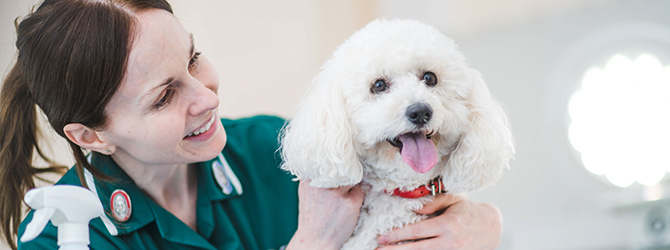Breathing problems in dogs: why is my dog panting?
3 min read
First Published: 11/03/2019
Last Updated: 22/10/2024
If you’ve noticed your dog breathing heavily or having difficulty breathing, there are many possible causes.
From rasping to excessive panting, difficulty breathing can be a sign of many underlying medical problems – so it’s important to speak to your vet for a diagnosis and suitable treatment.
We look at some of the most common causes of breathing problems and excessive panting in dogs.
Possible causes of a dog panting
Excessive panting and rapid breathing are signs that something could be wrong with your dog’s respiratory system – the part of the body responsible for delivering oxygen via the red blood cells to the organs of the body.
At its simplest, panting can be a normal reaction to heat or exertion. If this is the cause your dog’s breathing will return to normal after a short time. Panting could continue if your dog is too hot and overheating, if, for example, the weather is hotter than normal. Other causes of breathing problems in dogs are listed below. See our separate articles for more information on each condition:
- Allergies
- Asthma
- Brachycephalic Obstructive Airway Syndrome (BOAS) – caused by anatomical breeding changes in certain breeds, for example pugs and English bulldogs
- cardiomyopathy, valve disease or other forms of heart disease
- Fever
- Foreign object stuck in the throat
- Heat stroke
- Bacterial, fungal or viral infection such as Kennel cough, bronchitis or pneumonia
- Metabolic diseases
- Pain
- Pulmonary oedema
- Tracheal collapse
- Tumours
“If your dog has trouble breathing, contact your local vet fast – while there are a number of possible causes, it could be an emergency and it’s vital to act quickly.”
Is my dog at risk of breathing problems?
Dog panting and breathing difficulties can affect all ages and breeds of dog, though certain breeds are more susceptible to certain conditions. For example, small breeds, such as Maltese, Italian greyhounds and poodles are particularly at risk of bronchitis, tracheal collapse and mitral valve disease, while very large breeds are more likely to experience cardiomyopathy as a cause of heart failure leading to respiratory difficulties.
Some breeds are more susceptible simply because of the way they’re made – the narrow nostrils of short-faced breeds, such as bulldogs, make them more at risk of genetic (also called congenital) breathing problems and some types of tumour.
Puppies and young dogs, as well as elderly dogs and those with a weakened immune system, are also more at risk of developing some forms of breathing difficulties.
Symptoms of breathing difficulties in dogs:
- Dyspnoea (troubled breathing) see the box below
- Tachypnoea (rapid breathing)
- Choking
- Excessive drooling
- Panting
- Rasping
- Shallow, open mouthed breathing
- Tongue hanging out
Did you know?
Dyspnoea (troubled breathing) includes:
- open-mouthed, noisy breathing
- flared nostrils
- visible increased movement and effort of the chest and stomach during breath
- head held low and extended
- elbows turned outwards away from the body
- change in resting behaviour, dogs with respiratory difficulties may choose to sleep on their chest rather than their sides to aid breathing
Dog breathing fast or panting excessively? Act fast
If your dog has trouble breathing, contact your local vet fast – while there are a number of possible causes, it could be an emergency and it’s vital to act quickly.
How to prevent breathing difficulties?
The following measures will help to lower your dog’s chances of developing breathing problems:
- Don’t walk brachycephalic breeds in hot weather, or any dog in excessively high temperatures. Go early in the morning or in the evening once it has cooled down.
- Don’t smoke around your pets – passive smoking affects pets too!
- Vaccinate against Kennel Cough. This reduces the risk, severity and likelihood that the disease will be passed on to other dogs.
- Follow advice regarding health screening of certain dog breeds. Some heart conditions are much more manageable when caught early (before there are symptoms); contact your vet for more advice.
- Keep your pooch at a healthy weight. Obesity is a complicating factor in many diseases.
For more advice on panting or breathing difficulties in dogs:
For expert advice on breathing difficulties in dogs, contact your local vet.
Find your nearest vet using our Find a Vet page, or speak to a vet online using Online Vets.


